News
Outcrop Silver Generates New High-Grade Targets With up to 9,738 Grams Silver per Tonne in the Frias - La Ye Trend at Santa Ana
Outcrop Silver & Gold Corporation (TSXV:OCG, OTCQX:OCGSF, DE:MRG1) (“Outcrop”) is pleased to provide an update on its regional exploration and target generation program at its 100% owned Santa Ana high-grade silver project in Colombia. Outcrop continues to generate new exploration targets through mapping, trenching, and sampling, with the current focus along the 8.5-kilometre Frias-La Ye trend south of the Aguilar vein system. These new targets have never been drill tested.
Highlights
- Three new high-quality targets have been generated along the Frias-La Ye trend. These new targets express as very high-grade veins and float at surface and will be drill tested in the near term.
- In Los Mangos target, dump and outcrop samples respectively show up to 9,738 and 4,545 grams silver per tonne. Additional samples in the area show 27.71 grams gold per tonne.
- In La Ye target, an outcrop sample yielded 5.48 grams per tonne of gold and 2,141 grams per tonne of silver. An associated float sample from trenching returned 11.39 grams per tonne of gold and 4,043 grams per tonne of silver.
- In the Frias target, a float sample returned 29.63 grams gold per tonne, and an outcrop sample returned 1,181 grams silver per tonne.
- Directly north of the Frias to La Ye trend, three additional targets have been generated on the Aguilar vein system. Aguilar may be the northern extension of the Frias vein system. All six targets show surface values of over 1,000 grams equivalent per tonne and up to 9,380 grams equivalent silver per tonne in Los Mangos.
“We are thrilled with the results from our comprehensive target generation program, and we are working hard to prepare even more targets to drill later in the year,” stated Guillermo Hernandez, Vice President of Exploration. “As we progress in our efforts to generate our first Compliant Resource Estimation at the end of the year, we continue to advance prospects in the property, with the objective to quickly add more potential resource areas.”
“It is clear from reconnaissance mapping and prospecting that the entire trend between Las Naranjos, 2 kilometres north of the Royal Santa Ana mines, and the highly productive Frias mine, 18.3 kilometres southwest, is very prospective for new discoveries,” comments Joseph Hebert, Chief Executive Officer. “Additionally, each vein or trend consists of multiple subparallel and intersecting veins grouped within a 2-kilometre-wide corridor. Any veins within these corridors have the potential to provide high-grade shoots. Outcrop is beginning to define a world-class silver-gold district. The upside potential of the Santa Ana project, shown by outcropping of high-grade targets over many kilometres, is remarkable.”
Regional generative prospecting and exploration activities have been focused on three sectors along an 8.5 kilometres trend in the Santa Ana project's central and southern permitted areas (Map 1). The Mangos vein system is subparallel to and 2 kilometres east of the historical Frias Mine vein system (Map 2). The La Ye vein system is subparallel to the previously discovered Aguilar-Guadual vein system (News Release May 9, 2022, and July 5, 2022). Aguilar-Guadual is inferred to be the northeast extension of the Frias vein system (Map 2) nine kilometres to the south. Los Mangos and Frias are likely part of a 2-kilometre-wide corridor containing multiple veins that will be defined with further detailed work. Cumulatively, Los Mangos, La Ye, and Frias targets provide 3,450 metres of vein zones with high-grade silver and gold values. It is reasonable to expect new discoveries within the three new target areas, keeping in mind that Frias mine in the Frias target area has prior production of 7.8 million ounces of silver at a recovered grade of 1,300 grams silver per tonne.
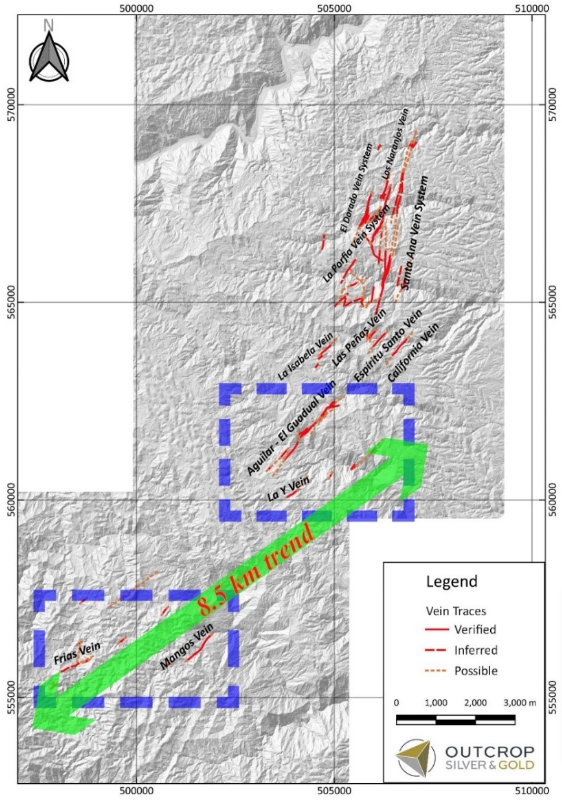
Map 1. The Frias-La Ye trend can be traced in outcrop for approximately 8.5 kilometres to the Frias mine area.
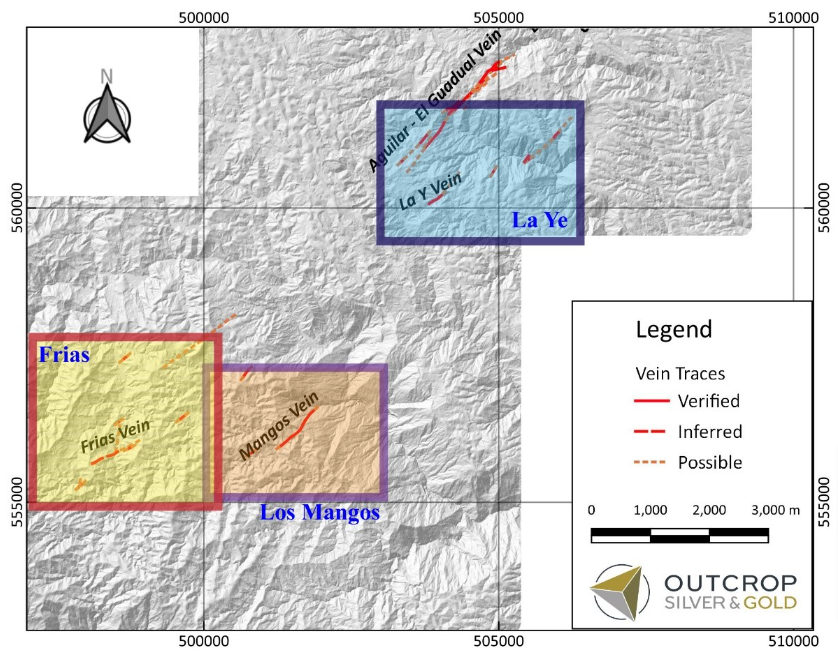
Map 2. Detailed location map from Los Mangos, La Ye and Frias Targets.
Los Mangos target
Los Mangos was discovered through mapping and rock sampling while evaluating geophysical anomalies. It is characterized by a series of parallel to sub-parallel veins oriented 220 to 240°, generally dipping 60 to 80° to the North. The main Los Mangos vein can be up to 1.20 m wide and wider when adjacent shears and veinlets along vein margins are included. The host rock varies from schists to granodioritic dikes, with the latter probably related to mineral deposition. The recognition of dikes associated with high-grade veins provides an exploration vector. Intrusive dikes can be detected with modeled airborne magnetic survey data as a proxy for potentially associated veins to generate target areas by remote sensing. These remote sensing vectors will aid regional-scale target generation. Targets can be identified by geophysics and then evaluated on the ground by priority.
Los Mangos has a continuity of 650 metres indicated by vein outcrop, historic mines, vein float mapping, and sampling. (Map 3). Vein material from historic mine dumps shows assays of 27.71 grams gold per tonne and 9,738 grams silver per tonne. Samples from insitu quartz veins from 20 historic workings returned up to 4,545 grams silver per tonne and 1,053 grams silver per tonne (Table 1). Prior experience in Santa Ana shows that high-grade veins in workings provide targets with a high probability of success in drilling.
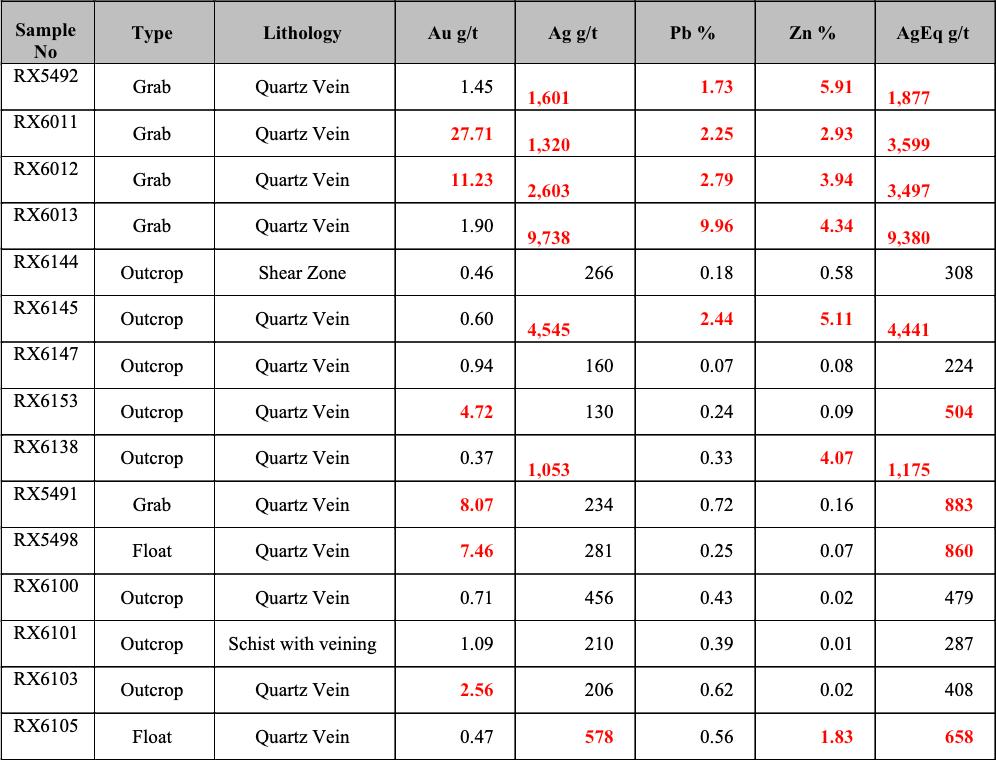
Metal prices used for equivalent calculations were US$1,827/oz for gold, US$21.24/oz for silver, US$0.90/lb for lead and US$1.56/lb for zinc. Metallurgical recoveries assumed are 93% for gold, 90% for silver, 90% for lead and 92% for zinc.
Table 1. Significant rock chips samples from Los Mangos Target.
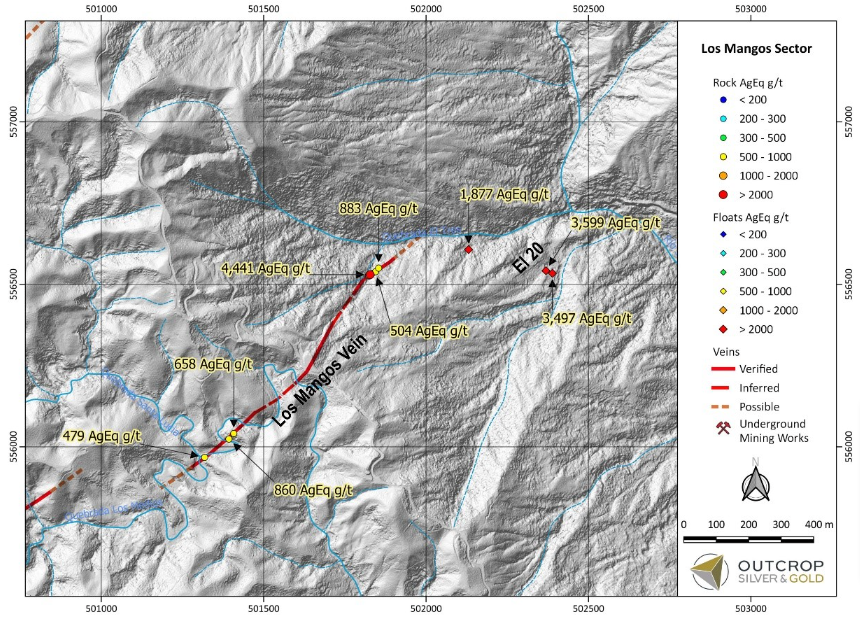
Map 3. Los Mangos target a detailed map with sample assays from this release.
La Ye target
La Ye was generated through regional-scale soil geochemical surveys, follow-up geological mapping, and outcrop sampling. La Ye is comprised of a primary quartz vein oriented 225° and dipping 55° to the north. The La Ye vein is up to 1.0 m wide, hosted by altered schists. High silver and gold grades appear closely related to crystalline quartz-bearing galena and pyrite.
La Ye shows continuity for 150 metres in outcrop and greater continuity of up to 1.5 kilometres through float mapping, sampling, and interpreting geochemical and geophysical surveys (Map 4).
Vein float, including - near insitu boulders, shows up to 13.21 and 11.39 grams of gold per tonne. Outcropping shear zones and sheared material in float show up to 4,043 and 2,141 silver grams per tonne, respectively (Table 2). It is significant for exploration potential to see high-grade values in both veins and shear zones.
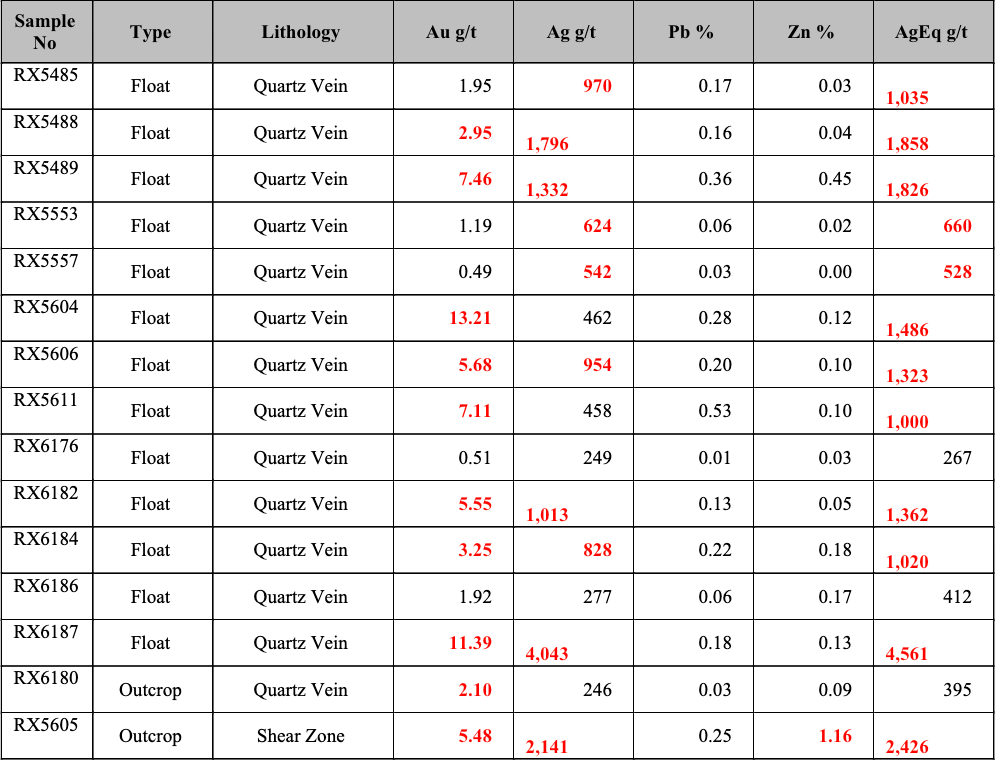
Metal prices used for equivalent calculations were US$1,827/oz for gold, US$21.24/oz for silver, US$0.90/lb for lead and US$1.56/lb for zinc. Metallurgical recoveries assumed are 93% for gold, 90% for silver, 90% for lead and 92% for zinc.
Table 2. Significant rock chips samples from La Ye Target.
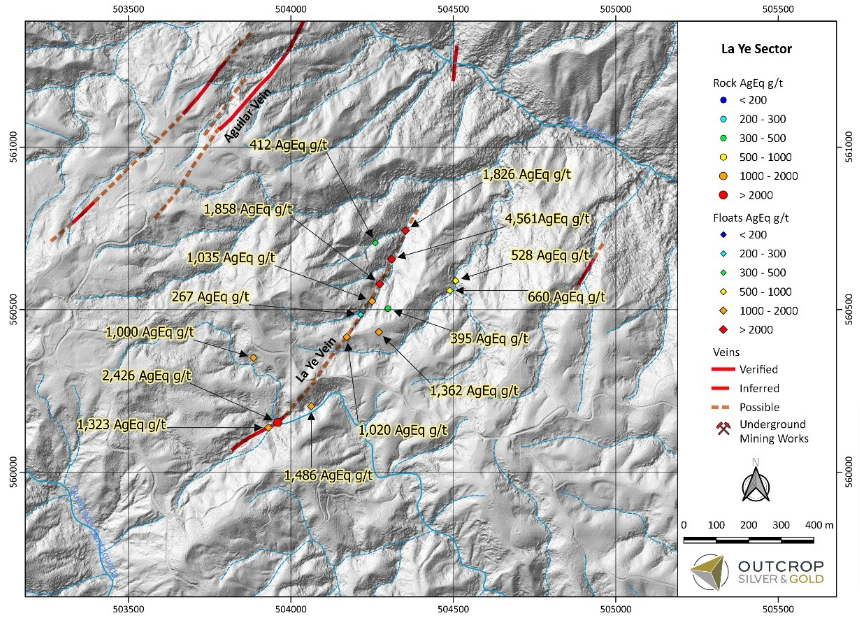
Map 4. La Ye target detailed map with sample assays from this release.
Frias and Topacio Targets:
Topacio is inferred to be an extension of the vein hosting the Frias Mine. Topacio was identified through prospecting along regional trends inferred from lineament and geophysical modelling. Where well exposed, Topacio is characterized by a sub-parallel narrow veins system oriented 210 to 240°, dipping 60 to 80° to the North. Packaged veins range between 0.2 to 0.5 metres in thickness. Mapping confirms a local strike length of 400 metres, but broader prospecting indicates that Topacio extends up to 1,300 metres (Map 5).
Assays from quartz vein float and outcrop respectively show up to 27.71 gold grams per tonne and 1,181 grams silver per tonne of silver (Table 3).

Metal prices used for equivalent calculations were US$1,827/oz for gold, US$21.24/oz for silver, US$0.90/lb for lead and US$1.56/lb for zinc. Metallurgical recoveries assumed are 93% for gold, 90% for silver, 90% for lead and 92% for zinc.
Table 3. Significant rock chips samples from Frias Target.
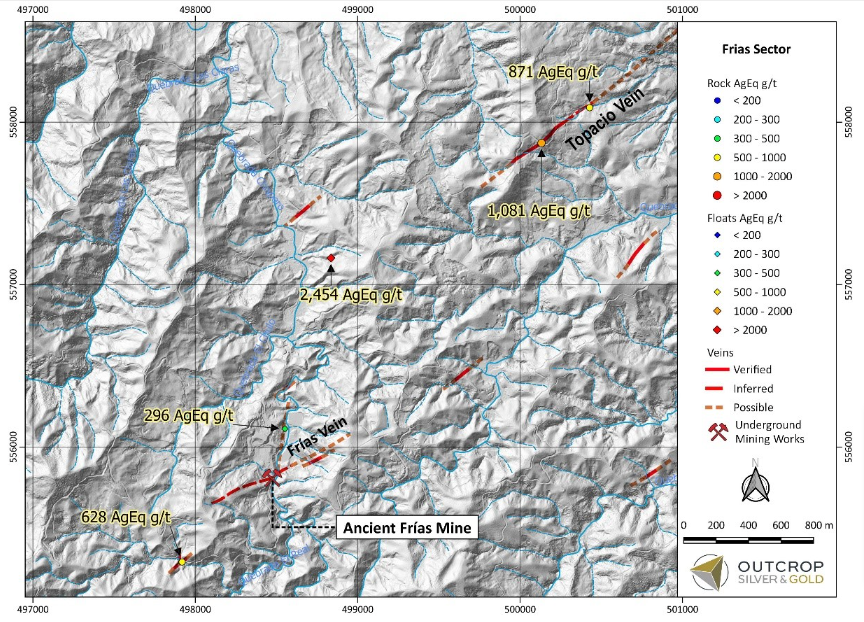
Map 5. Frias target a detailed map with sample assays from this release.
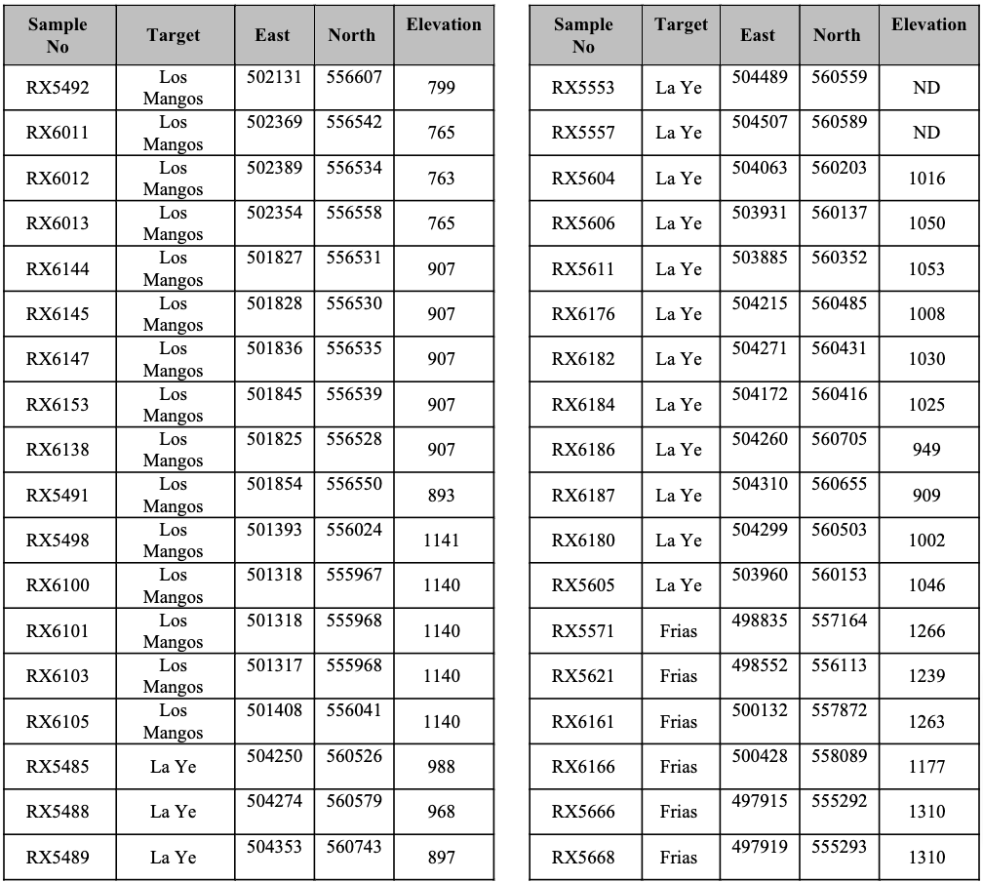
Table 4. Coordinates for samples reported in this release.
QA/QC
Core samples are sent to either Actlabs in Medellin or ALS Chemex in Medellin for preparation and then to ALS Chemex in Toronto or Lima, Peru, for analysis. In line with QA/QC best practice, approximately three control samples are inserted per twenty samples (one blank, one standard and one field duplicate). The samples are analyzed for gold using a standard fire-assay on a 50-gram sample with a gravimetric finish. Multi-element geochemistry is determined by ICP-MS using either aqua regia (ME-MS41) or four acids (ME-MS61) digestion. Comparison to control samples and their standard deviations indicate acceptable accuracy of the assays and no detectible contamination.
About Santa Ana
The 100% owned Santa Ana project comprises 36,000 hectares located in the northern Tolima Department, Colombia, 190 kilometres from Bogota. The project consists of five or more regional scale parallel vein systems across a trend 12 kilometres wide and 30 kilometres long. The Santa Ana project covers a significant part of the Mariquita District, where mining records date to at least 1585. The Mariquita District is Colombia's highest-grade primary silver district, with historic silver grades reported to be among the highest in Latin America from dozens of mines. Historic mining depths, vein textures and fluid inclusions studies support a geologic and exploration model for composite mesothermal and epithermal vein systems having mineralization that likely extends to great depth. At Santa Ana, it is unlikely that there is a sharp elevation restriction common to high-grade zones in many epithermal systems with no mesozonal component. The extremely high silver and gold values on Santa Ana reflect at least three recognized overprinting mineralization events.
At the core Royal Santa Ana project, located at the northern extent of just one of the regional vein systems controlled by Outcrop, thirteen high-grade shoots have been discovered to date – La Ivana hanging-wall and footwall (La Porfia vein system); San Antonio, Roberto Tovar, San Juan (Royal Santa Ana vein systems); Las Maras (Las Penas vein system); El Dorado, La Abeja (El Dorado vein systems); Megapozo, Paraiso (El Paraiso vein system); Espiritu Santo (Aguilar vein system); La Isabela and Los Naranjos. Each zone commonly contains multiple parallel veins. The veins can show both high-grade silver and high-grade gold mineralization, and low-angle veins appear to connect to more common high-angle veins.
Outcrop drilling indicates that mineralization extends from surface or near surface to depths of at least 300 metres. Cumulatively, over 60 kilometres of mapped and inferred vein zones occur on the Santa Ana project. The Frias Mine on the south-central part of the project, 16 kilometres south of the Royal Santa Ana Mines, produced 7.8 million ounces of silver post-production in the Spanish colonial era at a recovered grade of 1.3 kg Ag/t. The Frias Mine is considered an analogue to each of the thirteen shoots discovered to date by Outcrop. Between the Royal Santa Ana Mines and towards the Frias Mine, veins have been extended to the south providing strong drill targets in the 4-kilometre-long Aguilar vein and El Christo veins that show high values of up to 5.5 kg AgEq/t. These veins show widths up to 4.7 metres. In total, 12 kilometres of vein zones have been mapped between El Dorado vein to the north and the Aguilar vein to the southeast.
About Outcrop
Outcrop is rapidly advancing exploration on five silver and gold exploration projects with world-class discovery potential in Colombia. Outcrop is currently drilling and expanding the Santa Ana historic high-grade silver district. These assets are being advanced by a highly disciplined and seasoned professional team with decades of experience in Colombia.
Qualified Person
The technical information in this news release has been approved by Joseph P Hebert, a qualified person as defined in NI43-101 and President and Chief Executive Officer of Outcrop.
ON BEHALF OF THE BOARD OF DIRECTORS
|
Joseph P Hebert |
Kathy Li |
Neither the TSX Venture Exchange nor its Regulation Services Provider (as such term is defined in the policies of the TSX Venture Exchange) accept responsibility for the adequacy or accuracy of this release. Certain information contained herein constitutes "forward-looking information" under Canadian securities legislation. Generally, forward-looking information can be identified by the use of forward-looking terminology such as "potential", “we believe”, or variations of such words and phrases or statements that certain actions, events or results “will” occur. Forward-looking statements are based on the opinions and estimates of management as of the date such statements are made and they are subject to known and unknown risks, uncertainties and other factors that may cause the actual results, level of activity, performance or achievements of Outcrop to be materially different from those expressed or implied by such forward-looking statements or forward-looking information, including the receipt of all necessary regulatory approvals, capital expenditures and other costs, financing and additional capital requirements, completion of due diligence, general economic, market and business conditions, new legislation, uncertainties resulting from potential delays or changes in plans, political uncertainties, and the state of the securities markets generally. Although management of Outcrop has attempted to identify important factors that could cause actual results to differ materially from those contained in forward-looking statements or forward-looking information, there may be other factors that cause results not to be as anticipated, estimated or intended. There can be no assurance that such statements will prove to be accurate, as actual results and future events could differ materially from those anticipated in such statements. Accordingly, readers should not place undue reliance on forward-looking statements and forward-looking information. Outcrop will not update any forward-looking statements or forward-looking information that are incorporated by reference herein, except as required by applicable securities laws.
